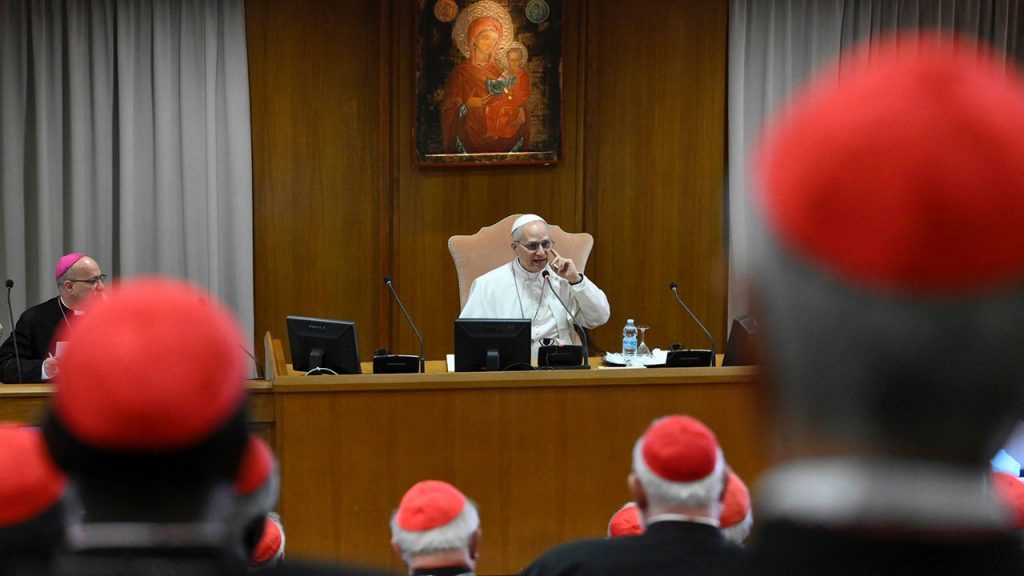In a pivotal address, Pope Leo XIV made his first public remarks as the newly elected leader of the Catholic Church at the New Synod Hall in Vatican City. During his speech to the College of Cardinals, he emphasized the pressing challenges posed by artificial intelligence (AI) to human dignity, calling for a robust response from the Church grounded in moral principles. Drawing parallels to the societal upheaval caused by the industrial revolution of the 19th century, he urged the Church to once again defend the vulnerable and advocate for justice in light of rapid technological advancements.
| Article Subheadings |
|---|
| 1) The Message of Pope Leo XIV |
| 2) A Historic Election |
| 3) Ethical Standards for AI |
| 4) Reflection on Transitioning Leadership |
| 5) Vision for the Future |
The Message of Pope Leo XIV
In his inaugural address, Pope Leo XIV articulated a profound concern regarding the implications of artificial intelligence. He urged the Church to engage with these technologies in a manner that prioritizes human dignity and social justice. The Pope’s remarks indicated a recognition of the potential risks inherent in rapid technological advancements. He called for moral clarity and bold actions, stating that the Church must act decisively to protect fundamental human values amidst a landscape increasingly dominated by AI. This message resonated as he highlighted the necessity for vigilance and ethical discernment in navigating this new frontier.
A Historic Election
Pope Leo XIV, previously known as Cardinal Robert Francis Prevost, marks a historic moment as the first American pope in the Roman Catholic Church’s history. His selection is seen as a unifying choice following the passing of Pope Francis. Cardinal Prevost has a rich background as a former missionary and led the Dicastery for Bishops. His fluency in English, Spanish, and Italian will likely enhance the Vatican’s connection with a diverse global audience. By choosing the name “Leo,” he intentionally aligns his papacy with Pope Leo XIII’s legacy, particularly focusing on social justice, an area that remains crucial in current societal contexts.
Ethical Standards for AI
Under the leadership of Pope Francis, the Vatican took significant steps to expand its digital presence and establish ethical guidelines regarding AI. Initiatives like the “Rome Call for AI Ethics” marked an important collaboration between the Church and technology leaders, emphasizing transparency in AI development and integrating ethical considerations into technological progress. Pope Leo XIV expressed a commitment to advancing this work, underscoring the potent power of AI in reshaping labor, social interactions, and even individual identities. He firmly stated that human beings, rather than profits, should remain at the core of all advancements.
Reflection on Transitioning Leadership
Pope Leo XIV reflected on the recent death of his predecessor, Pope Francis, viewing the transition of leadership as a significant moment loaded with both sorrow and divine grace. He articulated this period as a “paschal event,” representing a spiritual turning point for the Church. In honoring Pope Francis’s legacy, he conveyed gratitude for his life of service and indicated that the Church would continue down the path forged during his reign. He placed a strong emphasis on listening, dialogue, and outreach towards the poor, stressing the importance of maintaining the Church’s commitment to serve those in need.
Vision for the Future
In his address, Pope Leo XIV envisioned a Church grounded in its rich traditions while dynamically engaging with contemporary challenges. He emphasized the need for the Church to meet the future courageously, adapting to the technological changes that are reshaping humanity’s landscape. His comments called for a return to quiet prayer and discernment in a noisy digital age, alluding to biblical principles that via subtlety and reflection, spiritual truths can be discerned. The Pope’s message was one of hope and encouragement for Catholics to embrace this transformative era with a commitment to ethical practices and community involvement.
| No. | Key Points |
|---|---|
| 1 | Pope Leo XIV highlighted the ethical risks posed by AI to human dignity. |
| 2 | His election as the first American pope marks a historic change for the Vatican. |
| 3 | The Vatican has established ethical guidelines for AI development. |
| 4 | Pope Leo XIV acknowledged the legacy of Pope Francis, emphasizing continuity. |
| 5 | He urged the Church to maintain a commitment to social justice in a rapidly changing world. |
Summary
Pope Leo XIV’s first address as the new leader of the Catholic Church underscores significant challenges and the moral responsibilities the Church faces in the wake of technological advancements, particularly with AI. His call to defend human dignity aligns with a historical commitment to social justice, reflecting a progressive vision for the Church. This transition reflects both continuity from past leadership and a commitment to embrace the future with ethical integrity, providing a robust framework for engaging with contemporary issues.
Frequently Asked Questions
Question: What are the main challenges presented by AI according to Pope Leo XIV?
Pope Leo XIV highlighted that AI poses significant risks to human dignity and the ethical landscape of society, urging the Church to respond with moral clarity.
Question: How does Pope Leo XIV connect his papacy with that of Pope Leo XIII?
By choosing the name “Leo,” he intends to align his mission with Pope Leo XIII’s focus on social justice, signaling a commitment to addressing contemporary issues facing society.
Question: What initiatives has the Vatican undertaken regarding AI ethics?
The Vatican introduced initiatives like the “Rome Call for AI Ethics,” promoting transparency in AI development and encouraging ethical standards in technological advancement.


